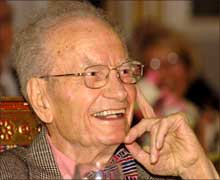India's first Nobel in economics, Amartya Sen, discovered America's first economics Nobel, Paul Samuelson, at the age of 17, reading Foundations of Economic Analysis. Looking back at six decades of his intellectual and personal association with Samuelson, who died last week, Sen calls Samuelson the "pre-eminent economist of our times". Excerpts from a conversation with Business Standard:
 How long has your association with Samuelson been?
How long has your association with Samuelson been?
Well, I first read Samuelson in 1951, when I was 17 and at Presidency College, Kolkata. At the College we were taught economics with mathematics and so I in fact first read his Foundations of Economic Analysis. It was only later, when I went to Cambridge (England) that I was told to read his introductory textbook, Economics. So, rather than go from Introduction to Foundations I did the opposite thing!
I first met Paul Samuelson in 1960 at MIT. I was a visiting assistant professor and in those days the economists used to have this large table in the faculty club at MIT where everyone used to sit. We congregated around that. Samuelson was an early lunch guy and we would sit around and chat with him. I recall some fantastic conversations with him.
His obituaries refer to him as the 'father of modern economics'. Do you agree?
He has a strong claim to be the pre-eminent economist of our times. The only competition he would get is from Kenneth Arrow and to some extent from John Hicks. He was also a fabulous human being.
There is no doubt that for anyone who aspires to be an economist and for anyone who wants to understand standard orthodox economics, the best two introductory books to read would be Samuelson's Economics and Hicks' Social Framework - both are brilliant textbooks. It is not surprising that Samuelson is called the 'father of modern economics', though I would imagine that should be said really of Adam Smith! But in the 20th century, Samuelson had by far the greatest impact on our discipline.
Would you not say that Keynes was the pre-eminent economist of the 20th century?
There is no doubt that John Maynard Keynes had more impact than any other economist on public policy in the 20th century. But his General Theory, which had many great insights, is not as systematic an analysis of economic theory as Samuelson's Foundations and Hicks' Value and Capital. Those who are critical of Keynes would say that his own theory was not fully developed. For example, it was all macroeconomics but does not address the question of how that relates to individual decisions of people.
In macro economics the objects you study are not human beings - people who are thinking, comparing, prioritising, choosing and are influenced by many variables, including social influences.
Macroeconomics is about gigantic objects like consumption, investment, liquidity confronting each other - like Mathew Arnold put it in his poem on Dover beach, where "ignorant armies clash at night". These macro variables are not ignorant armies but until you know how these things are moving, how they relate to individual behaviour, you don't have a complete grasp of economics.
This link, between macro and micro, became a subject in economics only after Keynes. What came to be called the 'microeconomic foundations of macroeconomics' - that is what many others who were influenced by Samuelson developed.
Samuelson's Economics is the best introduction to economics in general. It is amazing how well it is written. He was both a great creator and systematiser of modern economics.
Did he deserve the Nobel before Hicks?
I do think he deserved the very first Nobel in economics, though he got the second, in 1970. With his Foundations of Economic Analysis Samuelson made economics take a gigantic leap forward. I would rate his Foundations along with John Hicks' Value and Capital as the two great books of modern economics. Next to these two I would place Kenneth Arrow's work on general equilibrium theory and social choice theory.
As someone who takes a heretical view of mainstream economics, how would you evaluate Samuelson?
I have some heretical views on mainstream economics but that is not because I do not recognise the enormous reach of the contributions of Samuelson and Arrow, even about the nature of the market economy. Samuelson and Arrow recognised the limitations of mainstream economics in dealing with the limitation of market economics. Samuelson recognised this fairly early in his work on public goods. He recognised that the market economy does not deliver a framework for dealing with public goods.
Samuelson's work on public goods is central to contemporary debates. You cannot think of a sharper example of a public good than global climate. My global climate is no different from your global climate. It is very important to bear in mind that what we are debating today he was writing about it, at an abstract level, in the 1940s. His work included climate.
In the United States would you regard Samuelson as more influential than a conservative like Friedman?
Samuelson was a liberal economist. In the United States the conservative tradition in economics was defined by the Chicago School, which had a powerful influence on the discipline. Of course, its founder Frank Knight was a very broad minded person and in no sense was he a market fundamentalist.
I believe Knight was closer to Adam Smith - pointing out that the market does many good things but has its limitations. But the Chicago School evolved into a more ideologically market-oriented school that is reflected in Milton Friedman's work. Samuelson was a more non-ideological economist and an open-minded economist.
Was Samuelson ever interested in India like Friedman or Kaldor were? They had devoted time to advising Government.
I don't recall Samuelson ever visiting India. He wasn't a great traveller. Milton Friedman and Nicholas Kaldor engaged India in the realm of policy. Samuelson's influence in India was more through the work of his students, and the students of his students.
Economists like Robert Solow, Franco Modigliani and lot of people at MIT had great influence on teaching and on policy in India. I believe it is true to say that we live in a world which is full of Samuelson, even though he is himself no more with us.






